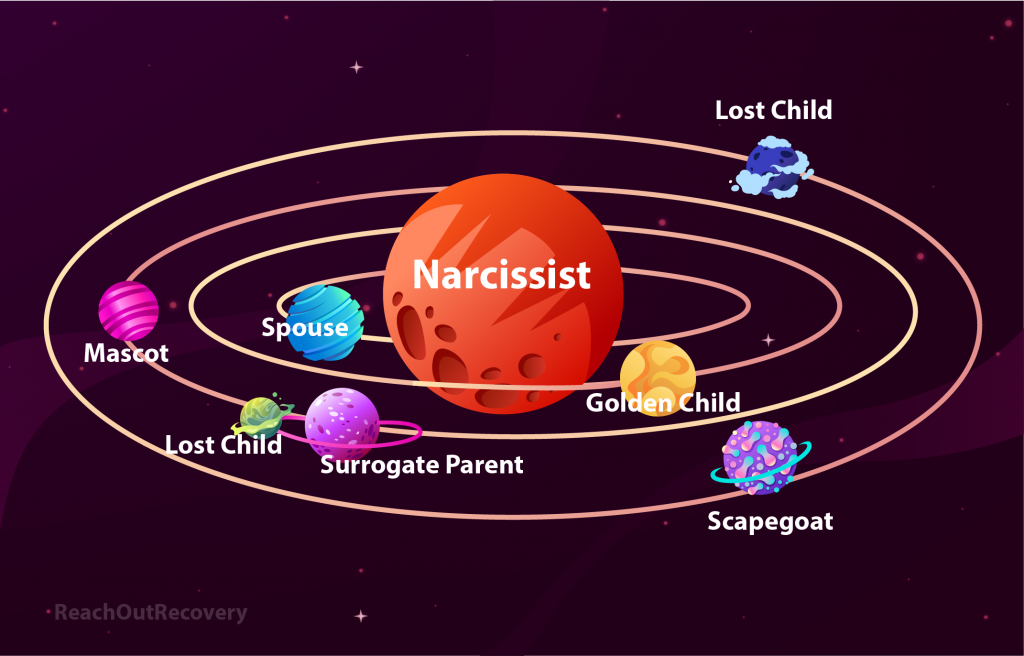Let’s Learn About Narcissistic Family Roles
Narcissist family roles may stick with you your whole life if you don’t understand what happened. You may wonder if you’re in a narcissistic family. Do you have family secrets you can’t ever tell? Maybe you’re a people pleaser or codependent and always end up attached to people who hurt you. Is your self-esteem a fragile egg shell easily broken? You may have grown up in a dysfunctional family where your needs for love and protection were not met.
Why Are Narcissist Family Roles So Hurtful
One common reason for family dysfunction is a parent (both parents or siblings) with a substance or alcohol use disorder. When addiction is in the picture, chaos reigns, and nobody’s mental health is protected or promoted. Children are traumatized in many ways. They can’t speak up or ask for help. Many people in recovery programs are victims of trauma and/or abuse as the result of family addiction. In fact, 2 out of every 3 people in recovery are victims of child abuse. More than 27 million Americans are adult children of alcoholism and addiction. Many don’t know what healthy families or relationships are like and need help to recover.
Another kind of dysfunction is the perfectionism resulting from a narcissistic parent. Narcissism is a character disorder. According to family experts Friel and Friel, authors of Adult Children, The Secrets of Dysfunctional Families, healthy functional families have eight traits in common.
A narcissistic family on the other hand operates under the rule of one dominating leader
Narcissistic families live in a fantasy world of perfection. The dominating parent sees the family as: a symbol of status and something they can control completely. Instead of having calm, loving and supportive parents, children grow up bullied and disparaged. The narcissist’s needs always come first, and the rest of the family is manipulated into compliance. Reputation, control, and power are at the top of the narcissist’s priorities.
Narcissist Family Roles Make Every Member Play A Part
This “role” depends on the image the narcissist wants to maintain and the qualities this member can offer to fulfill the image. Happy, well behaved and successful are three forms of perfection that have to be projected.
- The happy family: all is well and everyone is happy. No one misbehaves in public. The family is the picture of pure bliss and perfection. Selling this image is immensely important, as the slightest crack in this fantasy world can send a narcissist into an aggressive spiral.
- The successful family: success is one of the top priorities. Everyone must come in first in all they do. Best in show. Often there is no guidance, children have to figure out how to be the best. In other cases, however, the child must keep up with the parent who is the coach for perfection.
- The role in the family: Roles are assigned. Each member of the family falls into category that helps maintain the image. You’re a valued member as long as you follow your assignment. First-born boys are usually valued simply due to their gender and birth order. High grades or exceptional sports performances, or beauty also help a child be accepted.
The Narcissistic Family Roles
A Shakespeare quote, “All the world’s a stage” holds especially true for the narcissistic family. Life is always a show and usually a drama. Depending on the narcissist and the size of the family, roles may include:

Narcissist Family Roles: The Enabler
This could be a partner or a daughter who usually feeds the needs of the narcissistic parent. They help maintain that “happy” image and make excuses for the parent. This enabler will only get approval from the narcissist if they behave and bend to every wish. Enablers are generally submissive and aren’t usually too far from the narcissist.
Narcissist Family Roles: The Golden Child
Narcissists look for someone to mold (usually the first or second born). They want, basically, a mini-version of themselves. Since this is a huge role to fill, this child should be full of talent, attractive, and intelligent. However, this also depends on the narcissist’s preferences. If talent in sports matters most and the first born has no hand-eye coordination or can’t run long distances, the narcissist will move on to the second-born. The narcissist grooms the golden child, which leads to them bullying their siblings.
Narcissist Family Roles: The Surrogate Parent
Because narcissists are too concerned with themselves and the enabling parent tends to them, a child usually has to step up to be a form of parent. This child is in charge of their siblings’ well being and tends to suppress emotions.
Narcissist Family Roles: The Scapegoat, or problem child
This scapegoat-child is the one to be the emotional punching bag. Usually the most outspoken member of the family, the narcissist and other members will dump all of their anger and frustrations onto this child.
Narcissist Family Roles: The Lost Child
Essentially, this child doesn’t fit into any of the roles above. To keep the narcissist happy, this child must be silent and well-behaved. As they grow up without a designated role, they struggle to find their own identity and struggle with shame and confidence.
Narcissist Family Roles: The mascot
The role here is usually the youngest and the joker. Their humor and comic relief hides any of the dysfunction within the family.
More Articles To Read
10 Ways Narcissists Take Control
4 Tips To Grayrock Your Narcissist





















